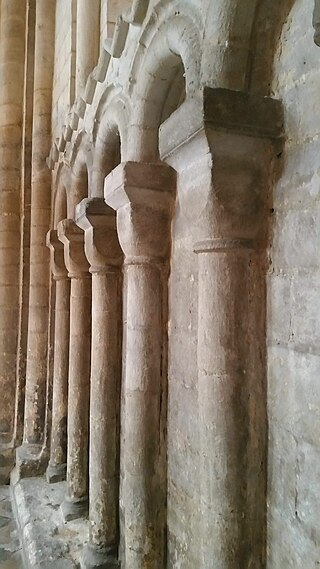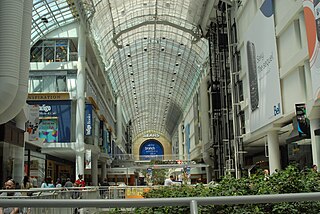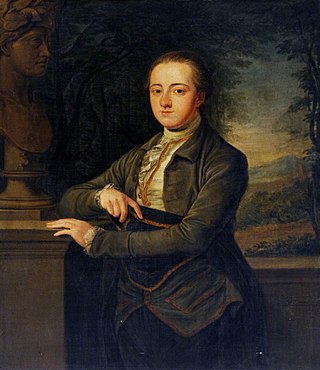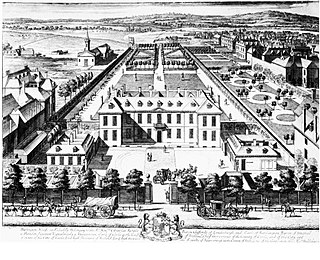
Richard Boyle, 3rd Earl of Burlington and 4th Earl of Cork, was a British architect and noble often called the "Apollo of the Arts" and the "Architect Earl". The son of the 2nd Earl of Burlington and 3rd Earl of Cork, Burlington never took more than a passing interest in politics despite his position as a Privy Counsellor and a member of both the British House of Lords and the Irish House of Lords. His great interests in life were architecture and landscaping, and he is remembered for being a builder and a patron of architects, craftsmen and landscapers, Indeed, he is credited with bringing Palladian architecture to Britain and Ireland. His major projects include Burlington House, Westminster School, Chiswick House and Northwick Park.

Earl of Cork is a title in the Peerage of Ireland, held in conjunction with the Earldom of Orrery since 1753. It was created in 1620 for Richard Boyle, 1st Baron Boyle. He had already been created Lord Boyle, Baron of Youghal, in the County of Cork, in 1616, and was made Viscount of Dungarvan, in the County of Waterford, at the same time he was given the earldom. These titles are also in the Peerage of Ireland.

Chiswick House is a Neo-Palladian style villa in the Chiswick district of London, England. A "glorious" example of Neo-Palladian architecture in west London, the house was designed and built by Richard Boyle, 3rd Earl of Burlington (1694–1753), and completed in 1729. The house and garden occupy 26.33 hectares. The garden was created mainly by the architect and landscape designer William Kent, and it is one of the earliest examples of the English landscape garden.

An arcade is a succession of contiguous arches, with each arch supported by a colonnade of columns or piers. Exterior arcades are designed to provide a sheltered walkway for pedestrians. The walkway may be lined with retail stores. An arcade may feature arches on both sides of the walkway. Alternatively, a blind arcade superimposes arcading against a solid wall. Blind arcades are a feature of Romanesque architecture that influenced Gothic architecture. In the Gothic architectural tradition, the arcade can be located in the interior, in the lowest part of the wall of the nave, supporting the triforium and the clerestory in a cathedral, or on the exterior, in which they are usually part of the walkways that surround the courtyard and cloisters.

A shopping center or shopping centre or mall, also called a shopping complex, shopping arcade, shopping plaza or galleria, is a group of shops built together, sometimes under one roof.

Palladian architecture is a European architectural style derived from the work of the Venetian architect Andrea Palladio (1508–1580). What is today recognised as Palladian architecture evolved from his concepts of symmetry, perspective and the principles of formal classical architecture from ancient Greek and Roman traditions. In the 17th and 18th centuries, Palladio's interpretation of this classical architecture developed into the style known as Palladianism.

Burlington House is a building on Piccadilly in Mayfair, London. It was originally a private Neo-Palladian mansion owned by the Earls of Burlington and was expanded in the mid-19th century after being purchased by the British government. Today, the Royal Academy and five learned societies occupy much of the building.

Burlington Arcade is a covered shopping arcade in London, England, United Kingdom. It is 196 yards (179 m) long, parallel to and east of Bond Street from Piccadilly through to Burlington Gardens. It is one of the precursors of the mid-19th-century European shopping gallery and the modern shopping mall. It is near the similar Piccadilly Arcade.
Burlington Mall is a shopping mall located in Burlington, Massachusetts. It was opened in 1968. As of 2022, the mall currently features Primark, Nordstrom, and Macy's, the mall currently includes retailers Fabletics, Madewell, Tory Burch, Burberry, and Kate Spade New York.

George Cavendish, 1st Earl of Burlington, styled Lord George Cavendish before 1831, was a British nobleman and politician. He built Burlington Arcade.

The Adelaide Central Market is a major fresh produce market in Adelaide, South Australia, Australia. As one of the oldest markets in Australia, Adelaide Central Market has a large range of fresh food, including fruit and vegetables, meat and poultry, seafood, cheeses, baked goods, small goods, and health foods, along with several cafés and eateries. Currently, approximately one million kilograms of fresh produce are delivered to the market and sold every month. It is a popular tourist attraction in the city, with more than 8.5 million visitors every year. It is also referred to simply as the Central Market. A $400 million redevelopment was approved in January 2021, which will include a mixed-use 35-storey building comprising offices, residential apartments and a hotel.

Isaac Ware (1704—1766) was an English architect and translator of Italian Renaissance architect Andrea Palladio.
Events from the year 1753 in Great Britain.

Cork Street is a street in Mayfair in the West End of London, England, with many contemporary art galleries, and was previously associated with the tailoring industry.

Galleria Alberto Sordi, until 2003 Galleria Colonna, is a shopping arcade in Rome, Italy named after the actor Alberto Sordi.

The Corridor is one of the world's earliest retail arcades, designed by architect Henry Goodridge and built in 1825, in Bath, Somerset, England.
The year 1756 in architecture involved some significant events.

Burlington Gardens is a street in central London, on land that was once part of the Burlington Estate.

Glasshouse is the third studio album by English singer-songwriter Jessie Ware. It was released on 20 October 2017 through Island Records. The album was supported by the singles "Midnight", "Selfish Love" and "Alone".

William James Neatby, often W. J. Neatby, was an English architect, designer and artist. He is best known for his designs of architectural ceramics and was Doulton and Co.'s chief ceramic designer. His standout works include the Meat Hall in Harrods (London), and Everard's Printing Works (Bristol). The Modern Style of the Everards Printing Works facade is the largest decorative Doulton Carrara ware tile facade of its kind in Britain. Neatby was among leading British artists during the late 19th and early 20th century. Ernest Augustus Runtz said of him: "He was a true artist, and a man of fine character, and he pursued his art with a direct and single purpose."

















